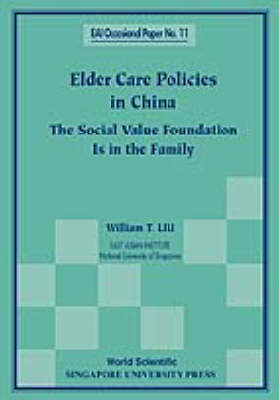
Elder Care Policies In China: The Social Value Foundation Is In The Family
Seiten
1999
World Scientific Publishing Co Pte Ltd (Verlag)
978-981-02-3795-0 (ISBN)
World Scientific Publishing Co Pte Ltd (Verlag)
978-981-02-3795-0 (ISBN)
- Titel z.Zt. nicht lieferbar
- Portofrei ab CHF 40
- Auch auf Rechnung
- Artikel merken
This publication examines topics including: the nature and scope of caregiving; the issue of care burden; and the claim that family-based care is really women care that is sex-biased. The author shows that care burden is a complex form of social relations that is shaped by the culture.
If modernisation means mass longevity, it raises hopes that everyone may enjoy a full span of years. It also brings the fear that many will not be able to take care of themselves and will rely upon society to provide special care. Modernisation in this sense also means the rise of the welfare state: let the government take care of the frail and the old.Mass aging has proven to be a financial crisis for welfare states in the advanced economies of the West; it also raises questions about the future of family-based care in the East while professionals and academicians in the advanced economies of the West continue to debate about whose responsibility it is to take care of the elders (the state or the individual?), governments in East Asia hold firmly to the position that it is the family that has the primary responsibility to take care of old members, and that the government's role is to assist families in discharging elder care responsibilities.This publication examines some of the often-raised questions identified in the research literature in the past 25 years — for example, the nature and scope of caregiving, the issue of care burden, and the claim that family-based care is really women care that is sex-biased. The author marshals evidence to show from studies conducted in China that care burden is a complex form of social relations that is shaped by the culture. Furthermore, the gender and type of relations may largely determine in what type of kin relations are the subjective feelings of burden the greatest and where objective indications of burden may remain constant. In conclusion, the author suggests that the best common resolution for both the East and the West is to establish a workable partnership between the state and the family in facing the forthcoming crisis of elder care in a fully aged society.
If modernisation means mass longevity, it raises hopes that everyone may enjoy a full span of years. It also brings the fear that many will not be able to take care of themselves and will rely upon society to provide special care. Modernisation in this sense also means the rise of the welfare state: let the government take care of the frail and the old.Mass aging has proven to be a financial crisis for welfare states in the advanced economies of the West; it also raises questions about the future of family-based care in the East while professionals and academicians in the advanced economies of the West continue to debate about whose responsibility it is to take care of the elders (the state or the individual?), governments in East Asia hold firmly to the position that it is the family that has the primary responsibility to take care of old members, and that the government's role is to assist families in discharging elder care responsibilities.This publication examines some of the often-raised questions identified in the research literature in the past 25 years — for example, the nature and scope of caregiving, the issue of care burden, and the claim that family-based care is really women care that is sex-biased. The author marshals evidence to show from studies conducted in China that care burden is a complex form of social relations that is shaped by the culture. Furthermore, the gender and type of relations may largely determine in what type of kin relations are the subjective feelings of burden the greatest and where objective indications of burden may remain constant. In conclusion, the author suggests that the best common resolution for both the East and the West is to establish a workable partnership between the state and the family in facing the forthcoming crisis of elder care in a fully aged society.
| Erscheint lt. Verlag | 6.1.1999 |
|---|---|
| Reihe/Serie | East Asian Institute Contemporary China Series ; 11 |
| Verlagsort | Singapore |
| Sprache | englisch |
| Themenwelt | Sozialwissenschaften ► Pädagogik ► Sozialpädagogik |
| Sozialwissenschaften ► Soziologie | |
| ISBN-10 | 981-02-3795-2 / 9810237952 |
| ISBN-13 | 978-981-02-3795-0 / 9789810237950 |
| Zustand | Neuware |
| Informationen gemäß Produktsicherheitsverordnung (GPSR) | |
| Haben Sie eine Frage zum Produkt? |
Mehr entdecken
aus dem Bereich
aus dem Bereich
Wissen, Haltung, Handlung
Buch | Softcover (2025)
Kohlhammer (Verlag)
CHF 49,95
Mensch-Tier-Beziehungen und tiergestützte Interventionen
Buch | Softcover (2024)
Kohlhammer (Verlag)
CHF 48,95


